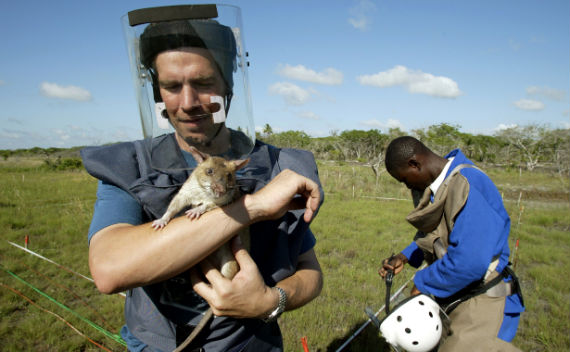’HeroRATs’ Corner Landmines and Tuberculosis in Africa

My research associate Asch Harwood and his brother adopted a "HeroRAT" for Father’s Day at the cost of about ninety dollars for one year. A Belgian NGO trains HeroRATs to sniff out landmines, and the rodents have also been remarkably successful in identifying laboratory samples infected with tuberculosis (TB).
The adoption fee pays for the care, feeding, and an amortized portion of their training costs for an individual giant pouched rat, a species native to sub-Saharan Africa. The rats usually live about eight years. Unlike dogs, giant pouched rats do not bond with their handlers, so professional staff flexibility and efficiency is maximized.
During the 1990s, Bart Weetjens, a Belgian engineer, discovered that the giant pouched rat could be trained to detect explosives in a laboratory. Subsequently deployed in the field, the trained rodents have proven to be highly successful light-weight land mine detectors. The rats can detect explosives made of plastic as well as metal, and they are so light that they do not detonate them. By 2010, APOPO (an acronym in Dutch for ‘Anti-Personnel Landmines Detection Product Development’) cleared close to eight hundred thousand square meters of land, mostly in Mozambique, at the nominal cost of $1.50 per square meter. Weetjens’ group has also taught HeroRATs to detect TB in laboratory samples, significantly decreasing the amount of time it takes to diagnose patients.
Landmines bedevil the continent, especially in Mozambique, Angola, and other areas recovering from civil war. Most of the 1.7 million deaths caused by TB in 2009 occurred in sub-Saharan Africa. HeroRATs are an innovative response to two humanitarian scourges. Bart Weetjen’s TED talk on HeroRATs is here.
 Online Store
Online Store